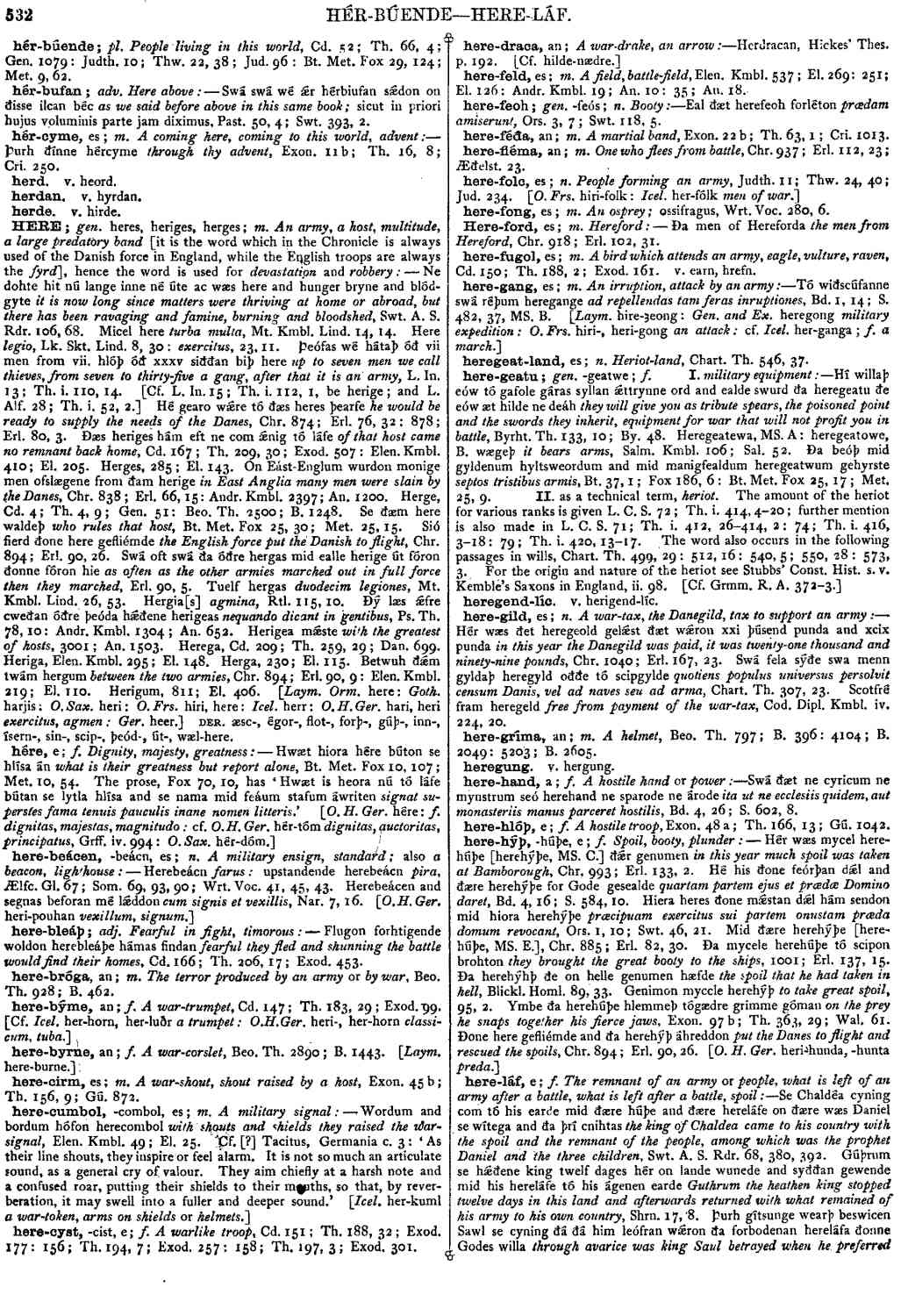HERE
- noun [ masculine ]
-
Ne dohte hit nú lange inne né úte ac wæs here and hunger bryne and blódgyte
it is now long since matters were thriving at home or abroad, but there has been ravaging and famine, burning and bloodshed,
- Swt. A. S. Rdr. 106, 68.
-
Micel here
turba multa,
- Mt. Kmbl. Lind. 14, 14.
-
Here
legio
,- Lk. Skt. Lind. 8, 30:
exercitus,
- 23, 11.
-
Þeófas wé hátaþ óð vii men from vii. hlóþ óð xxxv siððan biþ here
up to seven men we call thieves, from seven to thirty-five a gang, after that it is an army,
- L. In. 13; Th. i. 110, 14. [Cf.
- L. In. 15; Th. i. 112, 1, be herige ; and
- L. Alf. 28; Th. i. 52, 2.
-
Hé gearo wǽre tó ðæs heres þearfe
he would be ready to supply the needs of the Danes,
- Chr. 874; Erl. 76, 32 :
- 878; Erl. 80, 3.
-
Ðæs heriges hám eft ne com ǽnig tó láfe
of that host came no remnant back home,
- Cd. 167; Th. 209, 30; Exod. 507 :
- Elen. Kmbl. 410; El. 205.
-
Herges,
- 285; El. 143.
-
On Eást-Englum wurdon monige men ofslægene from ðam herige
in East Anglia many men were slain by the Danes,
- Chr. 838; Erl. 66, 15 :
- Andr. Kmbl. 2397; An. 1200.
-
Herge,
- Cd. 4; Th. 4, 9; Gen. 51 :
- Beo. Th. 2500; B. 1248.
-
Se ðæm here waldeþ
who rules that host,
- Bt. Met. Fox 25, 30; Met. 25, 15.
-
Sió fierd ðone here gefliémde
the English force put the Danish to flight,
- Chr. 894; Erl. 90, 26.
-
Swá oft swá ða óðre hergas mid ealle herige út fóron ðonne fóron hie
as often as the other armies marched out in full force then they marched,
- Erl. 90, 5.
-
Tuelf hergas
duodecim legiones,
- Mt. Kmbl. Lind. 26, 53.
-
Hergia[s]
agmina,
- Rtl. 115, 10.
-
Ðý læs ǽfre cweðan óðre þeóda hǽðene herigeas
nequando dicant in gentibus,
- Ps. Th. 78, 10 :
- Andr. Kmbl. 1304; An. 652.
-
Herigea mǽste
with the greatest of hosts,
- 3001; An. 1503.
-
Herega,
- Cd. 209; Th. 259, 29; Dan. 699.
-
Heriga,
- Elen. Kmbl. 295; El. 148.
-
Herga,
- 230; El. 115.
-
Betwuh ðǽm twám hergum
between the two armies,
- Chr. 894; Erl. 90, 9 :
- Elen. Kmbl. 219; El. 110.
-
Herigum,
- 811; El. 406.
Bosworth, Joseph. “HERE.” In An Anglo-Saxon Dictionary Online, edited by Thomas Northcote Toller, Christ Sean, and Ondřej Tichy. Prague: Faculty of Arts, Charles University, 2014. https://bosworthtoller.com/18861.
Checked: 1